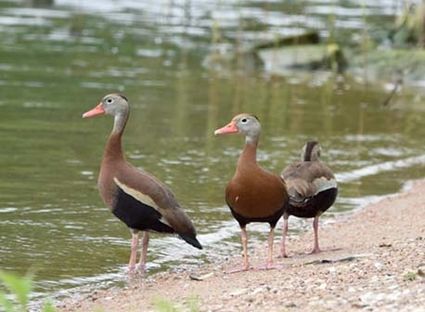Whistling ducks observed for first time in Jewell County
June 17, 2021

An abundance of water fowl can be seen in this area throughout the year. This week these Black- bellied Whistling Ducks appeared to be touring a local shoreline - an unusual sight. The Black-bellied Whistling-Duck is a boisterous duck with a brilliant pink bill and an unusual, long-legged silhouette. These ducks really do have a whistle for their call. Common south of the U.S., Black-bellied Whistling-Ducks occur in several southern states and are expanding northward.
While at Lovewell Lake last week, Jim Sullivan reported seeing three Black-Bellied Whistling ducks. He believes his may have been the first sighting ever in Jewell County.
Sullivan said it was pretty cool to see ducks that aren't supposed to be in this area. He saw them in the cabin cove.
The ducks were formerly called the Black-Bellied Tree duck. They normally breed in the southern most United States, Mexico and tropical Central to South-Central South America.
They are boisterous ducks with a brilliant pink bill and an usual long-legged silhouette. They prefer standing in shallow water instead of floating like the ducks more common in this area. In recent years the whistling ducks have been expanding northward.
During the Audubon Society's 1959-60 Christmas Bird Count, birders in deep South Texas recorded seeing 143 Black-Bellied Whistling ducks. This was the first time the species was included in the wintertime tally which began in 1903. Since then, their numbers have substantially increased.
They appear to be an extremely adaptable bird which likes to feed on small grains. They are especially fond of milo.
The ducks like to nest in dead trees but will readily accept nesting boxes. Some even nest on the ground. Both males and females have the same coloring. They have long legs and necks. In flight, their legs trail instead of being tightly tucked in. They have a high pitched, four-note, whistle-like call uttered most often while flying.
Many of their characteristics are more like those of swans and geese than ducks. Adults carry their young on their backs.




Reader Comments(0)